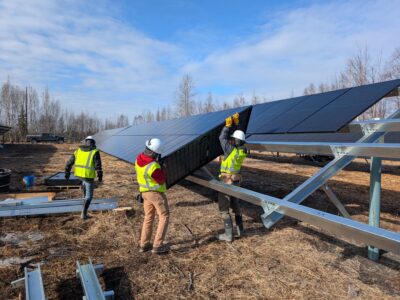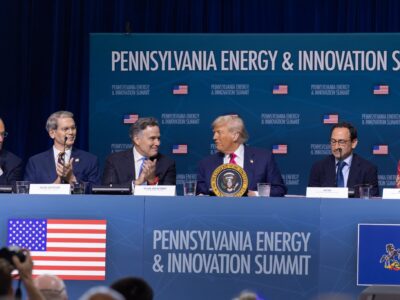In a House Energy and Commerce Committee hearing on March 5, Rep. Mariannette Miller-Meeks (R-IA-01) emerged as a strong advocate for preserving clean energy tax credits from the Inflation Reduction Act (IRA), highlighting their crucial role in economic development across the Midwest.
The hearing was focused on identifying ways to meet the energy demand for artificial intelligence, with bipartisan agreement that its rising trajectory must be dealt with soon. According to E&E News, it was also “intended, at least partially, as a forum for Republicans to make their case why the country needs more ‘baseload’ energy — which primarily means coal, natural gas and nuclear generation — to meet a projected surge in demand from power-hungry AI data centers.”
During the proceedings, numerous attendees advocated for clean energy tax credits, including Todd Brickhouse, CEO and general manager of Basin Electric Power Cooperative. Basic Electric operates hydropower plants in the Dakotas and Montana, wind projects in the Dakotas and Iowa, and solar in the Dakotas, with a recent announcement for a $4 billion Bison Generation Station that will produce almost 1500 MW of solar power. Brickhouse stated, “The immediate removal of [the production tax credit] will not allow utilities to plan for and avoid increased costs, and this will also immediately harm ratepayers.”
Rep. Brett Guthrie (R-KY-02), Chairman of the Energy and Commerce Committee, stated that because clean energy can be built speedily, it can help meet demand. He said that wind and solar power are important to the mix.
In addition, Rep. Miller-Meeks emphasized the positive economic impact of the tax credits on her state. “Tax incentives like the tech-neutral clean energy credits under [sections] 45Y and 45E, and the 45Q carbon sequestration credit, and the 45X advanced manufacturing credit aim to strengthen American manufacturing capability and reduce the engineering procurement and construction risks that have plagued major energy projects,” Rep. Miller-Meeks explained. Notably, she chairs the Conservative Climate Caucus, which seeks to “educate House Republicans on climate policies and legislation consistent with conservative values,” among other goals.
The push to maintain these tax incentives comes as Congress examines potential modifications to the IRA, with some lawmakers suggesting cuts to clean energy provisions. However, the economic impact of these tax credits is already visible in Iowa, where clean energy development has significantly boosted rural communities through tax revenue, land lease payments, and high-paying jobs. According to Environment America, Iowa ranked second in the nation for wind power production in 2023 and leads all states in the percentage of electricity generated from renewable sources. “Those tax credits are incredibly helpful in ensuring that we can get those projects built and online in a manner that’s affordable for our customers,” added Noel Black, senior vice president of federal regulatory affairs for Southern Co., at the committee hearing.
Each of these tax credits has proven to be a significant contributor to Iowa’s energy production and overall economy. 45Q benefits projects like ADM’s Decatur plant, which has captured more than 1 million tons of carbon annually. With the help of 45Y and 48E, the Clean Electricity Production and Investment credits, Iowa, in 2019, became the first state to produce 40% of its electricity from wind power. 45X, the Advanced Manufacturing Production Credit, helped the state attract more facilities, churning out battery parts, solar panels, and wind turbines. 45Z, the Clean Fuel Production Credit, supports the production of sustainable fuels from feedstocks grown in the state. In 2021, Iowa produced more than 4.4 billion gallons of ethanol, making it the top domestic producer.

Photo Courtesy Rep. Miller-Meeks
It is not the first time that Rep. Miller-Meeks has stood up for renewable energy. In prior hearings, she also advocated for these credits. She reflected on Iowa’s success in one, stating, “Our success didn’t happen by accident –it came from sustained policy support that allowed us to capitalize on our natural advantages. Repealing these credits without regard for investments already made would be a setback to clean energy and economic growth. I look forward to working with my colleagues to shape an energy agenda that puts America first.”
Additionally, last August, she was one of eighteen House Republicans to send a joint letter to House Speaker Mike Johnson supporting the credits. In March, she was one of twenty-one House Republicans to send a similar letter to Rep. Jason Smith (R-MO-8), Chairman of the House Ways and Means Committee.
Iowa’s success story demonstrates how strategic energy investments can support a thriving industrial economy. However, Tyler Norris, a Ph.D. student at Duke University and a witness at the hearing, pointed out that pushing too many resources toward legacy energy instead of newer renewables could stifle future investment in them. “If investors perceive policymakers are tilting the playing field toward gas or are creating excess capacity that substantially suppresses capacity prices, they may be reluctant to commit to these higher risk, long-term investments,” he noted.
He elaborated that the repeal of the tax credits could destroy entire domestic industries: “If there is a repeal of the IRA tech-neutral tax credit for nuclear, or any impact on the Loan Programs Office, there will not be a nuclear renaissance in the United States.”
As debate continues over the future of America’s energy policy, Rep. Miller-Meeks’s words underscore a growing recognition among conservatives that clean energy development represents both an economic opportunity and a path toward energy independence.
This article was created on March 20, 2025 with the assistance of the generative artificial intelligence (AI) tool Claude 3.7 Sonnet, using the linked company websites, press releases, reports, or external media coverage as inputted source material. It was then reviewed, fact-checked, and edited by one or more team members to ensure factual accuracy and consistency with editorial standards before publication.
While we strive for precision, reliability, and quality, readers should be aware that AI-generated content may have limitations in contextual awareness and nuance and may not be completely unbiased, consistent, error-free, or up-to-date. We recommend using this content only for informational purposes, as well as independently verifying it or conducting further research to supplement it. If you notice any inaccuracies or have concerns about this content, please contact our research manager at greg@consensus-digital.com.





